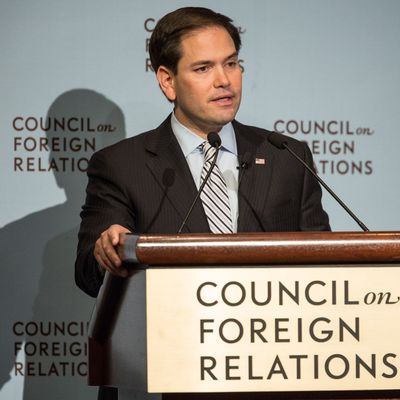
Before the Obama administration ended it last year, the Cuba embargo had virtually no support among foreign-policy experts of any ideological persuasion. Through five decades, the embargo showed no signs whatsoever of accomplishing its goal of weakening the communist party’s grip on power, and it imposed significant costs: economic costs to the United States, much larger humanitarian costs to Cuban people, and diplomatic costs to the United States, since the embargo had almost zero international acceptance.
That argument — that the embargo creates costs but no benefits — is important to keep in mind when reading Marco Rubio’s New York Times op-ed today castigating the administration for ending the embargo. The trouble with Rubio’s response is not so much that his response to this reasoning is weak so much as it is nonexistent. Rubio, or whoever writes Rubio’s foreign-policy op-eds, does not even engage with the terms of the debate.
Rubio begins by changing the terms of the debate:
WHEN President Obama announced the formal re-establishment of diplomatic relations with Cuba last week, he criticized the supposed failures of United States policy toward Cuba, which, Mr. Obama said, “hasn’t worked for 50 years.”
The reality of course is that American policy is no more to blame for Cuba’s economic and political problems than it was for the Soviet Union’s bread lines or for the fact that tens of millions of Chinese still live in poverty.
But of course Obama never said that the embargo is solely responsible for all political and economic problems in Cuba. He argued that it had failed to improve them.
Rubio proceeds to argue that lifting the embargo will not “automatically” create democracy:
However, our extensive experience with transitions from Communism has shown that economic opening and diplomatic engagement do not automatically lead to political freedom.
But, again, nobody argues that ending the embargo will create democracy in Cuba immediately, or even at all. The argument against the embargo is that it harms American interests and the Cuban people without any benefits. Rubio so far has made the case that having the embargo did not single-handedly create all of Cuba’s problems, and that lifting it will not singlehandedly solve all of them. He has not even attempted to claim that the embargo created any benefits, nor has he denied its well-documented costs. The entire notion of cost-benefit reasoning appears to be foreign to his thinking on this issue.
Opponents of the embargo always point out that the United States does not embargo trade with equally repressive communist regimes in China and Vietnam, so why single out Cuba? Rubio bizarrely cites the same examples:
China began its economic opening in 1979; today it remains a one-party state, where the human rights activist Liu Xiaobo, the 2010 Nobel Peace Prize winner, remains in prison, along with other dissidents. Calls for political pluralism are silenced. Vietnam, too, years after throwing its doors open to American corporations, continues to be tightly controlled by the Communist Party.
For many people in both countries, the standard of living has improved, but at a price: Prospects of political freedom for regular citizens are extinguished as elites with connections to the party become economic oligarchs. Chinese Communist Party leaders and their families have become rich beyond belief, and their grip on power seems unshakable.
The obvious question is, does Rubio propose to create an embargo against trade with China and Vietnam? He does not say that in his op-ed. But he also fails to explain why his own analogous example should be treated differently.
Rubio goes on to insist, “We should reinforce our longstanding policy” — the one that never worked for five decades — because, “If the Castros — President Raúl and his elder brother Fidel — realized that they would be able to profit only by reforming and allowing more political and economic openness, increased United States engagement might make a difference.” At no point does Rubio even attempt to explain why the old policy might start encouraging the Castros to liberalize their repressive political system after having completely failed to do so for nearly their entire lives.
In other words, Rubio has no response to any of the arguments against the embargo, nor does he have any defense of its success. So either Rubio is advocating it simply because he needs to pander to right-wing Cuban exiles, or he actually believes the vaporous emissions he or his foreign-policy advisers pretend constitute an argument.






























